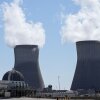
Cooling towers at the nuclear reactor facility at the Alvin W. Vogtle Electric Generating Plant in Georgia. The Nuclear Regulatory Commission is an independent agency charged with overseeing safety at the nation's reactors. Mike Stewart/AP hide caption
toggle caption
Mike Stewart/AP
President Trump has fired one of the five members of the independent commission that oversees the nation's nuclear reactors.
Nuclear Regulatory Commissioner Christopher T. Hanson was terminated on Friday, according to a brief email seen by NPR from Trent Morse, the White House Deputy Director of Presidential Personnel. The e-mail said only that Hanson's "position as Commissioner of the U.S. Nuclear Regulatory Commission is terminated effective immediately."
"All organizations are more effective when leaders are rowing in the same direction," White House Deputy Press Secretary Anna Kelly told NPR via e-mail. "President Trump reserves the right to remove employees within his own Executive Branch who exert his executive authority."
The Nuclear Regulatory Commission did not immediately respond to NPR's request for comment.
In a statement shared with NPR, Hanson said that he had devoted his term to "preserving the independence, integrity and bipartisan nature of the world's gold standard nuclear safety institution. … I continue to have full trust and confidence in their commitment to serve the American people by protecting public health safety and the environment."
Some observers of the nuclear industry were sharply critical of the decision. "I think that this coupled with the other attacks by the administration on the independence of the Nuclear Regulatory Commission could have serious implications for nuclear safety," says Edwin Lyman, director of nuclear power safety at the Union of Concerned Scientists, an environmental watchdog group. "It's critical that the NRC make its judgements about protecting health and safety without regard for the financial health of the nuclear industry."
The NRC was established by Congress in 1974 to strictly regulate nuclear reactors and protect Americans from exposure to radiation. By design, it has been overseen by a set of presidentially-appointed and Senate-approved commissioners, who are appointed to five-year terms. The White House has typically refrained from interfering with the agency, which is credited with maintaining a strong safety record at America's nuclear reactors since a partial meltdown at the Three Mile Island nuclear plant in 1979.
Last month, President Trump signed an executive order mandating sweeping reforms to the NRC. The order called for a "wholesale revision" of the agency's safety regulations in coordination with the White House Office of Information and Regulatory Affairs and the Department of Government Efficiency. It also calls for reductions in force at the agency, and for a reconsidering of some radiation safety standards.
The order was one of four signed by the president to promote America's nuclear industry. Trump signed the orders flanked by smiling industry executives, including one whose company had a reactor design previously rejected by the NRC, because the agency said it had failed to supply information about possible accident scenarios.

 5 hours ago
1
5 hours ago
1

 English (US)
English (US)